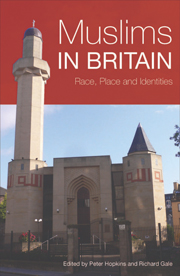Book contents
- Frontmatter
- Contents
- Acknowledgements
- List of contributors
- List of tables
- List of figures
- 1 Introduction: Muslims in Britain – race, place and the spatiality of identities
- Section 1 Gender, place and culture
- Section 2 Landscapes, communities and networks
- 6 British Arab perspectives on religion, politics and ‘the public’
- 7 The multicultural city and the politics of religious architecture: urban planning, mosques and meaning-making in Birmingham
- 8 Holy places, contested spaces: British Pakistani accounts of pilgrimage to Makkah and Madinah
- 9 Excess baggage or precious gems? The migration of cultural commodities
- Section 3 Religion, race and difference
- Afterword
- Index
6 - British Arab perspectives on religion, politics and ‘the public’
from Section 2 - Landscapes, communities and networks
Published online by Cambridge University Press: 05 August 2013
- Frontmatter
- Contents
- Acknowledgements
- List of contributors
- List of tables
- List of figures
- 1 Introduction: Muslims in Britain – race, place and the spatiality of identities
- Section 1 Gender, place and culture
- Section 2 Landscapes, communities and networks
- 6 British Arab perspectives on religion, politics and ‘the public’
- 7 The multicultural city and the politics of religious architecture: urban planning, mosques and meaning-making in Birmingham
- 8 Holy places, contested spaces: British Pakistani accounts of pilgrimage to Makkah and Madinah
- 9 Excess baggage or precious gems? The migration of cultural commodities
- Section 3 Religion, race and difference
- Afterword
- Index
Summary
Introduction
In October of 2006, a public debate erupted in Britain over comments made by Labour MP Jack Straw about his veiled female Muslim constituents. Straw stated in an interview that he had asked women to remove their face coverings when speaking to him in order to enhance communication between them. Denying any objection to a simple headscarf, Straw stated that he felt uncomfortable speaking to someone he could not see, reasoning that covering the face defeated the purpose of meeting in person rather than over the telephone or by e-mail. Moreover, he urged his veiled constituents to consider the consequences their religious garb had in terms of creating ‘parallel communities’ and feelings of ‘separateness’. ‘Communities’, Straw argued, are ‘bound together partly by informal chance relations between strangers, people acknowledging each other in the street, being able to pass the time of day, sharing just experiences in the street, and that is just made more difficult if people are wearing a veil …’ (BBC 2006). The veil, Straw suggested in his comments, is not simply another form of difference to be encountered in the everyday life of communities, but rather, an impediment to shared experience.
Shortly after the Straw episode, a case emerged in which a young Muslim teacher was suspended from her job for refusing to remove her face covering. The case was brought to court amid a chorus of commentaries by Labour ministers about the dangers of religious extremism, the oppression of Muslim women, and the threat to social harmony posed by overzealous Muslims.
- Type
- Chapter
- Information
- Muslims in BritainRace, Place and Identities, pp. 95 - 112Publisher: Edinburgh University PressPrint publication year: 2009



